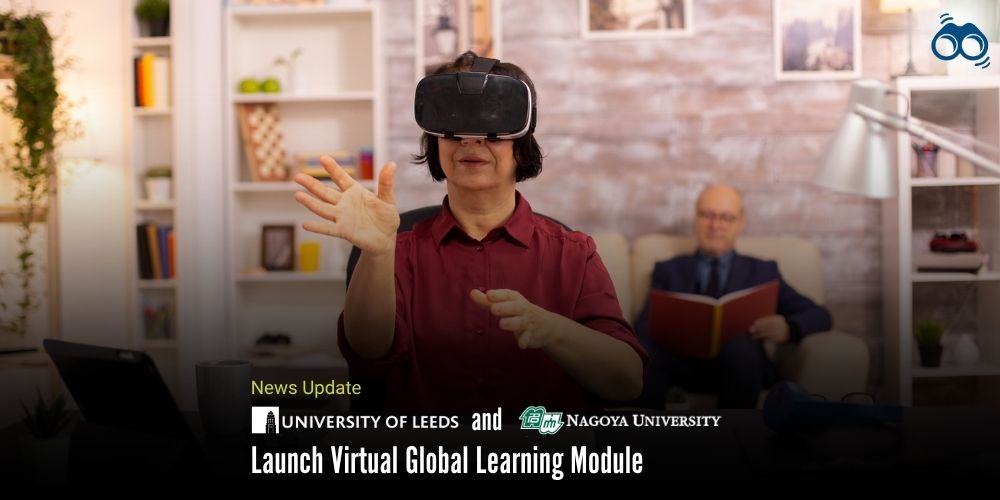Global Education Without Travel: Leeds Students Engage in International Projects
COIL Initiative Empowers Leeds Students with Cross-Cultural Learning
Universities across the globe are increasingly adopting digital collaboration to overcome geographical barriers and promote cross-cultural learning. At the University of Leeds, this transition is reflected in the implementation of international collaboration modules, particularly through the COIL (Collaborative Online International Learning) initiative. These modules enable students to engage in global discussions, work with peers from diverse academic backgrounds, and tackle real-world challenges such as air pollution, all within a virtual learning environment.
One such project involved Ella Butterfield, a second-year neuroscience student at Leeds, who collaborated with first-year students from Nagoya University in Japan. Co-led by Dr Alexandra Holmes from Leeds and Dr Maria Vassileva from Nagoya University, the module fostered academic and cultural exchange by facilitating direct communication between students across borders. Through this interaction, participants gained valuable insights beyond conventional classroom learning, without the financial and logistical challenges of traditional study-abroad programmes.
Ella Butterfield expressed that working with international peers provided her with a more personalised understanding of air pollution, shaped by real-life experiences shared by Japanese students. She found that collaborating with counterparts at Nagoya enabled her to better comprehend practical difficulties and develop more informed recommendations. She highlighted that such exchanges serve as a meaningful way to enhance cultural awareness without extensive travel or significant financial costs.
Her group further benefited from the collaborative process by integrating feedback from Nagoya students into their project. After learning that, despite Japan’s well-developed train network, car-related air pollution remained a pressing issue, a Yorkshire teammate proposed an app designed to help drivers locate electric vehicle charging points. The team’s findings were compiled into a portfolio, which also featured videos from Nagoya students illustrating aspects of everyday life in Japan.
Dr Holmes, from the Faculty of Biological Sciences, emphasised that COIL modules enable students to gain a deeper understanding of global challenges by engaging directly with those who have firsthand experience. While addressing local issues in Leeds is more tangible, tackling global problems can be abstract; however, receiving insights from individuals familiar with specific regions provides valuable context and often inspires more effective solutions. She also noted the advantages of interdisciplinary collaboration, citing an example in which a law student from Nagoya contributed legal insights concerning Japan. This input saved the team time on research and allowed them to focus on developing practical solutions.
The COIL programme at Leeds is led by Dr Martin Ward, Associate Professor of Chinese and Japanese Translation and the university’s COIL lead for Experiential Learning. He developed the first module in partnership with Southwest Jiaotong University in China, supported by the University’s International Strategy Fund (ISF)—a £7 million, five-year investment dedicated to strengthening global academic collaboration. Professor Hai-Sui Yu, Provost and Deputy Vice-Chancellor at Leeds, commended the initiative, noting that COIL modules enable students to collaborate internationally and explore diverse cultural perspectives without the environmental and financial costs associated with travel. Spanning a range of disciplines, including languages, sciences, business, and design, the programme involves partnerships with institutions in India, Africa, China, and Mexico, and the university is committed to expanding COIL opportunities in the future.
Similarly, Dr Maria Vassileva from Nagoya University noted that the experience benefited her students, allowing them to gain insights not possible through domestic collaboration alone. She emphasised that the interdisciplinary approach encouraged broader thinking, while managing time-zone differences and remote teamwork provided valuable real-world skills applicable to any international career. By fostering accessible, cross-cultural collaboration, the COIL initiative continues to shape global academic engagement and broaden students’ perspectives.
Editor’s Note:
The COIL initiative represents a forward-looking approach to international education, offering students a unique opportunity to collaborate across borders without the financial and logistical burdens of traditional exchange programmes. By integrating global perspectives into the learning process, students gain firsthand insights into real-world challenges, fostering deeper understanding and more practical solutions. This model of virtual engagement strengthens academic and cultural connections while ensuring accessibility for a broader range of students. Furthermore, the emphasis on interdisciplinary collaboration within COIL modules enhances the educational experience, allowing students from different fields to contribute their expertise. The success of these initiatives highlights the importance of innovation in higher education, demonstrating that meaningful global engagement does not always require physical mobility.
Skoobuzz observes that as universities continue to evolve, such programmes set a strong precedent for future learning models that prioritise collaboration, inclusivity, and real-world impact.














0 Comments (Please Login To Continue)